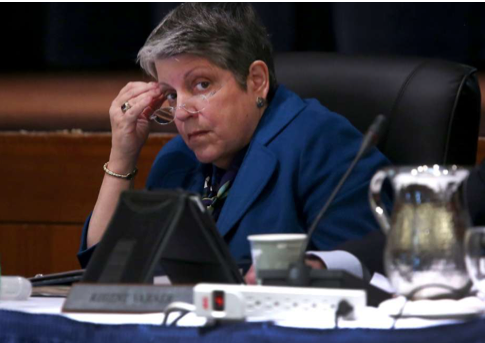CommentsCAL MATTERS--Let’s say you are the CEO of a Fortune 500 company that’s under scrutiny by the Securities and Exchange Commission for accounting irregularities.
And let’s say that when the SEC’s investigators sought information from other executives at your company, you insisted that their responses be funneled through your office and altered to reflect more favorably on your leadership.
Finally, let’s say that your manipulations were exposed. You probably would be fired by your board of directors for exposing the company to legal penalties and quite possibly prosecuted for interfering in an official investigation.
That brings us to the University of California and its president, Janet Napolitano, whose top aides intervened when the state’s auditor confidentially asked leaders of individual UC campuses about how she was handling certain finances.
As State Auditor Elaine Howle said in a report revealing that Napolitano’s office had $175 million in undisclosed reserves:
“We found it particularly troublesome that the office of the president intentionally interfered in our efforts to assess the types and quality of services it provides to campuses. Correspondence between the office of the president and the campuses shows that the office of the president inappropriately reviewed campuses’ survey responses, which resulted in campuses making changes to those responses prior to submitting them to us – campus statements that were critical of the office of the president had been removed or substantially revised, and negative ratings had been changed to be more positive.”
Howle’s bombshell generated a torrent of criticism from the Legislature, which had ordered the audit, and was eventually reflected in legislation making it an offense to interfere in a state audit.
UC’s Board of Regents initially did the right thing, ordering up an independent investigation by former state Supreme Court Justice Carlos Moreno.
The Moreno probe confirmed Howle’s allegations and singled out Napolitano’s top two aides, Seth Grossman and Bernie Jones, for pre-screening the campus responses “with the specific purpose of shaping the responses to be less critical” of Napolitano’s office.
However, Moreno’s report more or less let Napolitano off the hook by declaring while she had approved a review of the campus responses there was “insufficient evidence to conclude that she was aware of (the aides’) conduct in purposefully and systematically targeting unfavorable responses.”
Napolitano issued a quasi-apology this month for exhibiting “poor judgment” while the Regents said her plan to review campus responses “reflected poor judgment and set in motion a course of conduct that the Board of Regents finds unacceptable.”
It stretches credulity to believe that Napolitano’s top two staffers would have done what they did without her knowledge, but they walked the plank by resigning while the “insufficient evidence” caveat gave the Board of Regents an excuse to keep her on the job.
A final note: A year earlier, Napolitano had sent a 15-page letter to the Board of Regents, accusing UC Davis Chancellor Linda Katehi of engaging in questionable activities for personal aggrandizement – a letter that pushed Katehi to resign rather than be fired.
“The investigation has demonstrated that Chancellor Katehi repeatedly misled UC leadership, the UC Davis community and the public about matters that would cast her in a negative light,” Napolitano wrote.
It calls to mind the old adage about not casting stones when one lives in a glass house, or another about doing as I say, not as I do.















